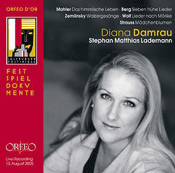This particular Liederabend offers a selection of music by five late-Romantic composers, Alban Berg, Gustav Mahler. Alexander Zemlinsky, Hugo Wolf, and Richard Strauss, and presents some repertoire performed infrequently.
More familiar, perhaps in the opera house, Damrau offers a different side of her voice in the more intimate venue of the song recital. This provides those who are familiar with Damrau to hear her perform literature that they could not hear elsewhere. One of the selections, for example, is the Strauss song “Amor,” which is remarkably similar to the music associated with Zerbinetta in the composer’s opera Ariadne auf Naxos and in this context provides a fine connection between Damrau in the opera house and her efforts in the recital milieu. That song in particular demonstrates not just Damrau’s facility, but her virtuosity in performing the lengthy coloratura melismas associated with Zerbinetta but here, in the more exposed medium of voice and piano. It is a persuasive performance, all the more remarkable for Damrau’s performance at the conclusion of an otherwise full recital.
As to the other literature performed, Damrau performed entire sets of Lieder, starting with Berg’s Sieben frühe Lieder, a selection of songs from the early part of his career, when the pulls between the late-Romantic style and the atonal idiom he would pursue are audible from the start in “Nacht,” which Damrau delivers convincingly. “Traumgekrönt,” with its text by Rainer Maria Rilke, has a similar sense, which Damrau brings out not only in her execution of the line, but also in her enunciation of the text. (In Berg’s “Liebesode” Damrau’s work on the stage is perceptible in the rolled “r” of the word “Arm,” an element that she brings into her performance of the piano version of “Das himmlische Leben,” the Song-Finale of Mahler’s Fourth Symphony.)
With Zemlinksy’s Walzergesänge this infrequently heard piece conveys a sense of Brahms’s vocal Liebeslieder waltzes, with the inflection of the kind of modernism heard a generation later, albeit inspired by the Tuscan folksongs of Ferdinand Gregorovius. These short, early settings by Zemlinsky do not yet embody the kind of expressive dissonances that are part of the composer’s Lyrische Symphonie, yet clearly take the listener into the late Romantic idiom, as found distinctively in “Ich geh’ des Nachts.” These pieces are removed from the idiom Wolf used in the five settings of Eduard Mörike performed in this recital. Her approach to “Lebe wohl” captures the style of the text well, and stands out for its moving interpretation. Likewise, the pianism of Landemann is nicely heard in “Nimmersatte Liebe,” where it sets the tone for the song at the beginning. His subtle conclusion of the last of the Wolf set is effective in bringing this relatively lengthy setting to an appropriate musical ending.
With Strauss’s relatively early set Mädchenblumen, op. 22, Damrau offers another perspective on the late-Romantic Lied. The register of several of these songs, like “Kornblumen” fit Damrau’s voice, and she offers some solid performances of these seldom heard pieces. That son and others in the cycle are unified by the images of flowers, and the deft touch Damrau gives the music is quite effective, something nicely connected with her inclusion of a later setting by Strauss of “Ich wollt’ ein Sträußlein binden” (“I will make a bouquet”), a song which literally connects the parts of the song cycle and, through the author of text, Clemens Brentano, creates a link to the final piece on the recital, the song “Amor.”
The audience was quite enthusiastic about Damrau, and the applause is nicely captured on the recording, which also preserves the four encores she gave: Mahler’s song “Wer hat dies Liedlein erdacht?” along with two selections from Wolf’s Italienisches Liederbuch “Auch kleine Dinge” and a virtuoso treatment of “Ich hab’ in Penna” and, at the end, a song by Liszt, “Es muss ein Wunderbares sein.” The latter is a curious piece that adds an earlier composer to the recital with this piece that also conveys, as Damrau remarks, as a means of expressing her own enthusiasm for this recital.
This recording captures a fascinating recital that not only serves to document the Salzburg Festival, but also serves as a fine example of programming. As various expressions of late-Romantic music, the music Damrau performed offers several perspectives on the style and her own facility with each of the composers represented. As such, it serves well in making available some vibrant interpretations of song repertoire by an exceptional performer.
James L. Zychowicz
